







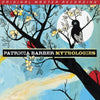
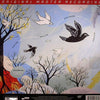
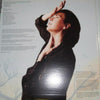
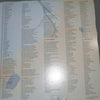

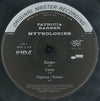
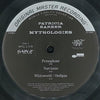
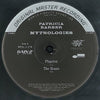
Patricia Barber – Mythologies (2LP, Ultra Analog, Half-speed Mastering)
ORDER LIMITED TO ONE ITEM PER CUSTOMER
Vocals, Piano – Patricia Barber [click here to see more vinyl featuring Patricia Barber]
Vocals – Airreal Watkins (D1), Grazyna Auguscik (D2), Paul Falk (C1), Walter “Mitchell” Owens, III (Hip-Hop Groove At End of D1), Lawrice Flowers (Verse in D1)
Backing Vocals– Choral Thunder (D1-2)
Bass – Michael Arnopol
Drums – Eric Montzka
Guitar – Neal Alger
Tenor Saxophone – Jim Gailloreto (A1-2, D1)
Vocal Arrangement by Bryan Johnson (D2)
Composed by Patricia Barber
2 LP, gatefold jacket
Limited numbered edition
Original analog Master tape : YES
Half-speed Mastered
Gain 2™ Ultra Analog
Heavy Press : 180g
Record color : black
Speed : 33RPM
Size : 12”
Stereo
Studio
Record Press : unspecified
Label : MOFI
Original Label : Blue Note
Recorded at the Chicago Recording Company by Jim Anderson
Mixed by Jim Anderson at Avatar Studios
Engineered by Jay Ten Hove "Sonic Marvel"
Produced by Patricia Barber
Mastered by Alan Tucker at Foothill Digital
Originally released in 2006 (as a CD)
Reissued in 2010 (first time as an LP)
Tracks:
Side A:
- The Moon
- Morpheus
- Pygmalion
Side B:
- Hunger
- Icarus (For Nina Simone)
- Orpheus/ Sonnet
Side C :
- Persephone
- Narcissus
- Whiteworld/ Oedipus
Side D:
- Phaethon
- The Hours
Reviews:
“Is it still art when you can fingerpop to it? Finally, it's arrived. In 2003 jazz songwriter, pianist, and bandleader Patricia Barber received a Guggenheim fellowship to create a song cycle based on Ovid's Metamorphoses. Barber is that rare kind of jazz artist -- she appeals to non-jazz fans. She's as ambitious as they get and her poetic, sometimes brainy compositions sit well with sophisticated pop audiences everywhere. On Mythologies, Barber has taken the heart of Ovid's text (he was a Roman poet doing his own intertextual take on Greek mythology) and created 11 pieces, each based on one character in his cycle. She's in turn written a different piece -- in style, linguistic content, and feel -- for each character she was drawn to. Much like the poet, philosopher, and playwright Anne Carson, Barber uses the present vernacular to recontextualize these seemingly eternal characters in the bedrock of jazz and her own brand of sophisticated and literary pop; she places Ovid's poems where they belong -- in song. Barber is accompanied by her crack band -- guitarist Neal Alger, bassist Michael Arnopol, and drummer Eric Montzka -- and employs as many guests as it takes to get her songs across. This isn't the gutting of ancient high culture; it's the presentation of it as something instructive, personal, and revelatory in the inner life of the songwriter. Musically, beginning with the spacious yet knotty piano notes that usher in "The Moon," Barber takes Ovid's characters, sets their context in the present vernacular (mostly), and allows them to manifest the faces of those we know, have known, or have been: "With whitecake/On my face/The actress backstage/Contemplates/Laying a universal egg/Still a broken heart/Is a broken heart...." The stillness of the moon witnesses all, and we enact our life scenarios under it, whether true or false. Alger underscores the vocal lines with small single-line runs and effects, as does the near constant bass of Arnopol. When the skittering hip-hop drums kick in after the verse ends, the band takes off, cracks the groove open (Barber's lower-register notes usher in the blues and then arpeggiates out of them), and works it.” AllMusic Review by Thom Jurek
“The end result of a Guggenheim fellowship, Patricia Barber's latest, entitled "Mythologies" is the best work yet from this talented Chicago pianist/singer/composer. An updated and personal reexamination of the "Metomorphoses" of Ovid - itself a penetrating psychological study within the stories of the archetypical/mythological characters whose actions and behaviors cover the spectrum of humanity - "Mythologies" follows its source closely in providing both delights and contemplative rewards.
Timeless and compelling even still after the centuries, the "Metamorphoses" presents of wealth of material to draw upon. Ovid's characters fall prey to all forms of human weakness and folly - from greed, violence, hunger and prideful hubris, to love and narcissistic self love and of course in the end: death. Barber's characters may move through late night casinos and drive Hummers, but they exhibit the same tendencies that have beguiled and haunted our forebears throughout history.
But don't let the serious subject matter disuade you - the songs themselves are a joy. From intriguing opener "The Moon" - featuring Jim Gailloreto's fierce tenor sax, through the beautiful choral closer "The Hours," Barber and her crew are never less than entrancing. The music ranges from cocktail jazz to gospel, blues, rock, fusion, pop, experimental free jazz, and even rap. Of the quiet numbers "Narcissus" explores obsessive love and self-love(gay love?) in depth, while "Morpheus," with its repetitive bass may be the most beautiful ballad Barber has written. Up tempo pieces also fare well, as in "Icarus" which recasts the famous myth of the boy who flew too high within the story of singer Nina Simone in an arrangement that glides and rises as though on a wild wind. Old favorite "Whiteworld" makes a welcome appareance as well, again featuring blazing guitar work from Neal Algar while skewering modern Western colonial society.
In perhaps the boldest and most unusual move, Barber adds youthful rappers on "Phaeton." As they recount a list of endangered species, we are reminded of the unsettling and uneasy impact of humanity upon this garden planet. All in all an impressive and worthwhile outing from the always engaging Ms. Barber.” Brad Walseth, Jazz Chicago
Ultra Analog™ : The GAIN 2 Ultra Analog™ Series stems from the use of the Gain 2 system, mastered at half speed from the original master tapes where possible, capturing and uncovering as before undiscovered sonic information.
Half-speed mastering. In half-speed mastering, the whole process is slowed down to half of the original speed. A typical 33 1/3 rpm record is cut at 16 2/3 rpm. The source material is also slowed down (reducing the pitch in the process) meaning the final record will still sound normal when played back. Slowing the whole process down allows more time, which means the end result sounds better and is more efficient — allowing engineering to minimize the effects of inherent limitations within the vinyl format. The result is a more accurate and more open high-frequency response in the half speed vinyl when compared with a normal speed recording.
Ratings :
AllMusic : 4.5 / 5 ; Discogs : 4.52 / 5




